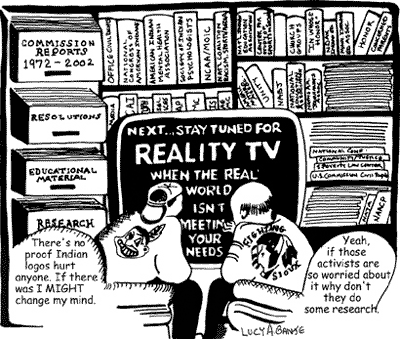It's a kind of catch-22 situation for North Dakota's Indians. They will be expected to comply with UND's wishes out of the goodness of their hearts. If they refuse to cooperate, they will immediately become the "bad guys" responsible for the "loss" of "Fighting Sioux." I regard it as outrageous to make North Dakota's Indians bear the burden of settling a controversy they didn't create, about a nickname that appropriates their culture without their consent, using two terms ("fighting" and "Sioux") that do not accurately or fairly represent their cultural identity. If Lakota-Dakota Indian leaders use this moment, in which they are essential to the white man's happiness, to cut the best deal they can for the betterment of their people (which is just what you would expect in any other trademark deal), they will be accused of greed and their "Indianness" will be called into question. Do you see how profoundly unfair that is?


4 comments:
Writerfella here --
Only comment: the word the writer searched for but didn't find was -- 'expropriates' -- NOT 'appropriates'. Otherwise, it had a nice beat and was easy to Ghost Dance to, writerfella gives it a 75...
All Best
Russ Bates
'writerfella'
The writer used "appropriate" appropriately:
http://dictionary.reference.com/browse/appropriate
ap·pro·pri·ate /adj. əˈproʊpriɪt; v. əˈproʊpriˌeɪt/
–verb (used with object)
3. to set apart, authorize, or legislate for some specific purpose or use: The legislature appropriated funds for the university.
4. to take to or for oneself; take possession of.
5. to take without permission or consent; seize; expropriate: He appropriated the trust funds for himself.
Writerfella here --
Ah, yes, the 'sixth-grade' reading and writing levels once again, as that is the only reason a fifth-listed meaning of a word somehow is represented as being the primary definition. In writing, word choice is paramount and wrong choices stay wrong, no matter the writer's intent after the fact...
All Best
Russ Bates
'writerfella'
Since you misread the dictionary definition, your reading level must be even lower. The definition I listed is the third one, not the fifth one, for the verb "appropriate." It's the fifth definition only if you combine the separate definitions for the adjective and the verb.
More to the point, your sub-6th-grade reading level must explain why you didn't know all the definitions of "appropriate." That's why you stupidly and wrongly tried to correct the original author. Oops.
Better luck next time, chum. Let me know if you need more help with your subpar English.
Post a Comment